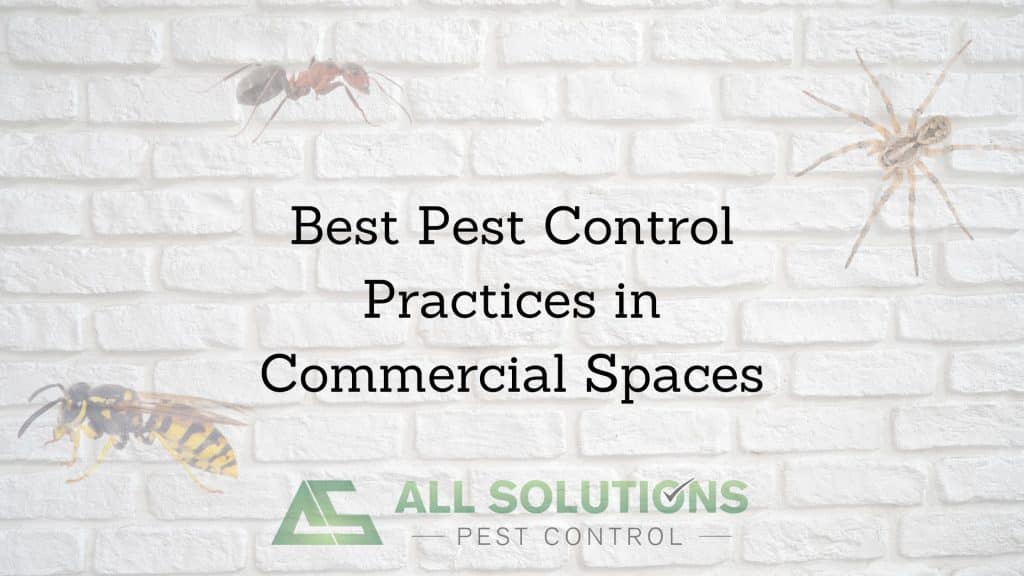As a business owner or manager, it is essential to maintain a pest-free environment to ensure the health and safety of your employees, customers, and the integrity of your products or services. So, in this blog, we will discuss effective pest control strategies that can help you prevent and manage pest infestations in your commercial spaces. Because investing in effective pest control practices is not only a proactive measure but also a testament to your commitment to providing a clean and healthy environment for everyone associated with your commercial space.
Regular Inspections
Regular inspections are the foundation of any successful pest control program. Schedule routine inspections of your premises to identify and address any potential pest issues promptly. Work with a professional pest control company that specializes in commercial spaces to conduct thorough inspections and create a customized pest management plan for your business.
Integrated Pest Management (IPM) Approach
Implementing an Integrated Pest Management (IPM) approach is crucial for long-term pest control. IPM focuses on preventive measures, monitoring, and targeted treatments, reducing the need for excessive pesticide use. By combining various strategies such as sanitation, exclusion, and regular maintenance, IPM provides effective, environmentally friendly pest control solutions.
Proper Sanitation Practices
Maintaining cleanliness in your commercial spaces is vital for pest prevention. Regularly clean and sanitize all areas, paying extra attention to high-risk areas like kitchens, break rooms, and storage areas. Properly store food items in sealed containers, dispose of garbage promptly, and ensure that employees adhere to strict sanitation guidelines.
Exterior Maintenance
Pests often gain entry to commercial spaces through cracks, gaps, and openings in the building’s exterior. So, regularly inspect and seal any potential entry points, including windows, doors, utility openings, and ventilation systems. Keep a well-maintained landscape, keeping shrubs and trees trimmed away from the building, because they can provide hiding spots and pathways for pests.
Employee Education and Awareness
Educate your employees about pest control practices and the importance of early detection. Train them to identify signs of pest activity, such as droppings, chewed wires, or unusual odors. Encourage them to report any sightings or concerns promptly. By fostering a culture of awareness and accountability, you can create a proactive approach to pest control within your organization.
Regular Monitoring
Regular monitoring is crucial to detect pest activity early on so you can address it before it becomes a full-blown infestation. Consider using non-toxic monitoring tools such as sticky traps, pheromone traps, and insect light traps to monitor the presence and population of pests. Work closely with your pest control provider to develop a monitoring plan that suits your business needs.
Professional Pest Control Services
Partnering with a professional pest control company experienced in commercial spaces is essential for effective pest management. These experts have the knowledge, skills, and tools to identify and address pest problems comprehensively. They can provide regular treatments, monitoring, and documentation to ensure compliance with regulations and maintain a pest-free environment.
Regular Maintenance and Repairs
Regular maintenance and prompt repairs are crucial to eliminate pest-friendly conditions. Fix leaky pipes, repair cracks in walls, and ensure that the building’s infrastructure is in good condition. By addressing these issues promptly, you can minimize the risk of pest infestations and create an inhospitable environment for them.
Proper Waste Management
Effective waste management is crucial in commercial spaces to prevent pest infestations. Establish a proper waste management system that includes regular garbage disposal, proper storage of waste in sealed containers, and maintaining cleanliness in waste storage areas. Implementing recycling programs can also help reduce the attractiveness of your premises to pests.
Documentation and Record-Keeping
Maintaining thorough documentation and record-keeping is essential for effective pest control in commercial spaces. Keep detailed records of pest sightings, treatments conducted, inspection reports, and any corrective actions taken. Because this documentation can serve as a valuable reference. Helping you track the effectiveness of your pest control measures over time. Additionally, it can assist in demonstrating compliance with regulations and providing necessary documentation during inspections.
So by implementing these ten best pest control practices in your commercial spaces, you can create a safe and pest-free environment for your employees, customers, and products or services. Remember to schedule regular inspections, adopt an Integrated Pest Management (IPM) approach, maintain proper sanitation practices, and partner with a professional pest control company. By taking proactive measures and following these guidelines, you can effectively prevent and manage pest infestations, ensuring the success and reputation of your business.
So, in addition to the benefits of a pest-free environment, practicing effective pest control in your commercial spaces can also save you money in the long run. Because preventing infestations means you can avoid costly damages to your property, equipment, and inventory. Moreover, a pest-free environment promotes a positive image for your business, reassuring customers that their health and well-being are a top priority.
Call us at All Solutions Pest Control today to schedule a consultation with our experienced team of pest control experts. So take the first step towards a pest-free environment and ensure the success of your business!
